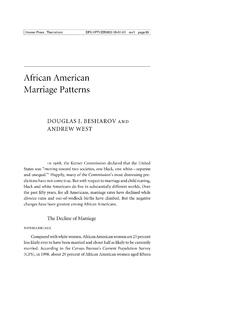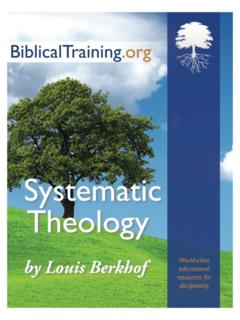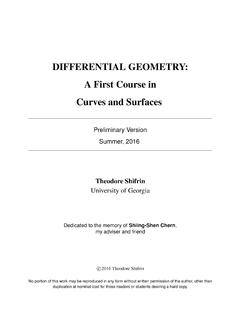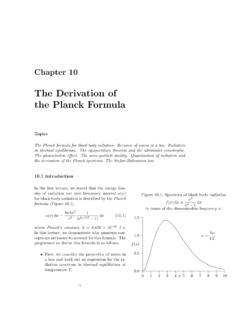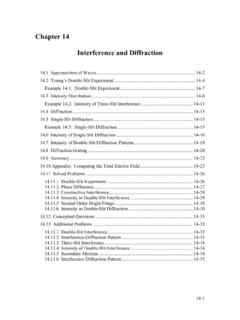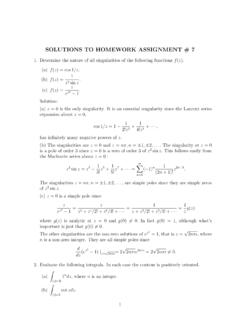Transcription of The Meaning of Equality - Hoover Institution
1 The Meaningof EqualityNicholas Capaldi a descriptive concept and a normative a descriptive concept, Equality is, by definition, an adjectivalrelation between entities that are identical in some specific two entities can be identical in all respects, for then they wouldnot be two entities but the same entity. The Equality may be oneof quantity or quality. Equality may be predicated of things, per-sons, or social entities such as institutions, groups, and so is also a normative concept. As a normative concept, Equality is the notion that there is some special respect in which allhuman beings are in fact equal (descriptive) but that this factualequality requires that we treat them in a special way. Special treat-ment may mean ensuring identical treatment, or it may mean dif-ferential treatment to restore them to or to aid them in reaching orrealizing the specific factual as a normative concept, as we shall soon show, is centralto modern political and social debate.
2 All disagreements aboutequality as a normative concept center on (1) factual claims aboutthe specific sense or senses in which human beings are identical, (2)what constitutes relevant special treatment, that is, which specificHoover Press : Machan ( Equality )DP5 HPEQUA0100 05-06-01 rev1 page 1senses carry normative weight, and (3) factual claims about whichpublic policies are consistent and coherent with and effective inensuring the relevant special treatment. The ancients held to an organic and hierarchical conception of theworld, one, therefore, that was antiegalitarian. All of nature, in-cluding the social world, consists of a series of interlocking entities,each with its own built-in goal. Each entity in turn was a means tothe satisfaction of a higher-level goal. The social world was highlystratified to reflect differences of ability that in turn led to differ-ences of function and a corresponding difference in status.
3 Theancient world thus held to the notion of a collective good, that is,a good that was more important than and subsumed all of the lessergoods. This view was reflected in actual social practice, so that evenwithin Athenian democracy, women, slaves, and aliens were ex-cluded from citizenship. The collective good consisted of the sur-vival of the city as an internally self-ruled entity. It was the city, orpolis, that was the locus of freedom, understood as self-rule. Free-dom was not predicated on individuals. Rather, individuals werefulfilled when they performed their relevant proper function inmaintaining the city s freedom. No sharp distinction was madeamong politics, ethics, and religion. Ultimate fulfillment camewithin the political political theorists advanced the same view. In Plato sRepublic, a just society was identified with a harmonious society,and a harmonious society consisted of one in which the division oflabor was exactly correlated with individual differences of when Plato seemingly recognized superior women and ad-vocated the Equality of women, many scholars have maintainedthat he did so tongue-in-cheek and ultimately stressed the need foran overriding functional division of labor.
4 For Aristotle, equalityHoover Press : Machan ( Equality )DP5 HPEQUA0100 05-06-01 rev1 page 22/Nicholas Capaldimeant the same treatment of similar persons, 1that is, personswho had the same status. Aristotle was more concerned that thosewho were unequal be treated differently. Moreover, the demandfor Equality on the part of those who are unequal or inferior leads,according to Aristotle, to Roman thinkers, theStoics asserted a form of factual Equality in that all men possessedthe rational capacity to grasp the universal order, but the Stoics didnot draw from this any normative conclusions about altering socialstatus. Christianity is the origin of the modern conception of Equality , but,as we shall see, its full impact does not come into play until theReformation. Christianity proclaimed the equal moral worth of allpersons in the eyes of God.
5 Equality is now understood as intrinsicto the human condition. It is the special respect in which all humanbeings are in fact equal (descriptive).Christians drew both on Stoic doctrine and the Hebrew notionfrom Genesis that all human beings male and female were createdin the image of God. The Christian doctrine of Equality as ex-pressed by Paul (Galatians 3:26 29) is that There is neither Jewnor Greek, there is neither bond nor free, there is neither male norfemale: for ye are all one in Christ Jesus. This view was repeatedin Colossians 3:10 11. There are echoes of this conception ofequality in Confucianism, Hinduism, and question arises as to what specific normative implicationsfollow from this conception of Equality in the medieval Christiancontext. Recognizing Equality among human beings requires that1.
6 Aristotle,Politics, translated by Benjamin Jowett, inBritannica Great Books,vol. 9 (Chicago: 1952), VII, Ibid., VI, Press : Machan ( Equality )DP5 HPEQUA0100 05-06-01 rev1 page 3 The Meaning of Equality /3we treat them in a special way. Special treatment may mean ensur-ing identical treatment, or it may mean differential treatment torestore them to or to aid them in reaching the specific factual understand how this developed in the medieval Christiancontext, we need to recognize the political innovation of Christi-anity. In the words of Eric Voegelin, Christianity dedivinized thestate. That is, Christians denied that ultimate human fulfillment wasto be achieved through participation in the polis. A distinction isintroduced between politics on the one side and religion and ethicson the other. Fulfillment comes though participation in theChurch.
7 Christians, then, occupy two cities, to use Augustine sconception. Whereas the role of the polis in Aristotle was a positiveone, namely, to help make human beings good or to achieve ful-fillment, the role of the state in Augustine s scheme is negative,namely, to thwart evil, or what we would call maintain law andorder. Christian liberty consists in the recognition by the state ofthe independent status of the Church, and that fulfillment comeswithin the spiritual domain. This is the origin of the modern con-ception of limiting the power of the fulfillment comes by participation within the Church,Christians have no direct interest in political participation or polit-ical rights such as Equality before the law. Christians could techni-cally even be slaves. Slavery was held to be a consequence of regard to membership within the Church, Christians stillmaintained the classical hierarchical conception.
8 Clergy were dis-tinguished from laypeople. This was not considered a violation ofthe notion of Christian Equality because to achieve salvation, thesacraments needed to be administered by someone in a theologi-cally superior position. Christians were all equally entitled to thespecial treatment of receiving the sacraments that paved the way toeternal salvation in the next life. Non-Christians were all equallyentitled to become Christians and subsequently to receive the sac-raments. They were not all equally entitled to administer the sac- Hoover Press : Machan ( Equality )DP5 HPEQUA0100 05-06-01 rev1 page 44/Nicholas Capaldiraments. Moreover, the sacraments could be denied to Christianswho had been excommunicated precisely because they threatenedthe independent existence and integrity of the Church. Becket sconflict with Henry II comes to mind in this context.
9 In short,Christian Equality was seen in the medieval period to require specialtreatment understood in a way that led not to identical treatmentbut to differential important consequences of Christian Equality were thegradual disappearance of slavery in Europe and the fact that theChurch served as the main Institution of social mobility. When theissue of slavery with regard to the Native Americans in the NewWorld was debated, it was Aristotle s argument about natural slavesthat served as the basis for advocating slavery, and it was the Chris-tian conception of the Equality of all before God that served as thebasis for opposing slavery. It was now thought that someone whohad been baptized, including the native population of the WesternHemisphere, could not be enslaved. Equality became a central notion with the advent of modernity,specifically the Protestant Reformation.
10 Let us begin with modern-ity. The difference between the classical viewpoint and the modernviewpoint is the locus of standards. For classical thinkers, includingmedieval thinkers, all standards whether of truth, goodness, orbeauty were structural features of the world external to humanbeings. What gave authority to some and not to others was thebelief that some individuals had direct and immediate access tothose external standards (by knowledge or grace). Once those stan-dards were apprehended, our obligation was to conform to object of wisdom was conformity to the natural order of modern thinkers, all standards are internal. The apprehen- Hoover Press : Machan ( Equality )DP5 HPEQUA0100 05-06-01 rev1 page 5 The Meaning of Equality /5sion of these internal standards might lead to contact with a tran-scendent and/or external order (as in Descartes), but the initialapprehension was internal.




